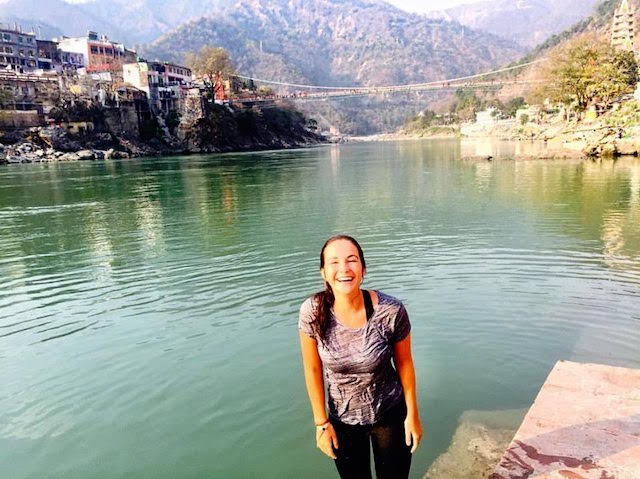
It’s said that if we’re seeking God, all we must to do is look into the eyes of a child.
When I was five years old, I looked up at my Dad after gazing out the car window for some time and with a Buddha-like smile on my face said, “Hey Dad, you know what? I love all the people.”
Fast forward a few decades and we all know what happens. We’re bogged down by relationship problems and mortgage payments, which are sitting on top of our restless minds. Things used to be so simple, but now most of us are living with more confusion and pain than ever.
How did we get from such peace to clutter?
As for me, I wasn’t about to accept this situation as a fact of reality, so I went on a quest to regain my youthfulness.
My journey has led me toward letting go of the self and all of the rigidity that comes with it, to merge with something that’s always been there. I’ve moved closer to being that peaceful little girl again. Not in the sense that I’m becoming her, but that I am her, now. I always have been and always will be.
If my journey toward the light can be compared to walking down the airport terminal to my gate, the teachings of spiritual guru, Mooji Baba, put me on one of those accelerated speed walkers. Mooji is Jamaican-born disciple of Papaji, traveling the world as a spiritual teacher and guru to millions.
As I stood in the queue waiting among hundreds of other seekers to attend my first satsung (spiritual Q&A) with Mooji, I was unaware of the instantaneous shift of consciousness soon to come. I stood in this line every morning for two weeks, each day marinating deeper into the truth of my own self.
The teachings boil down to the idea that we all share one common being, free from the constraints of our conditioned and impermanent sense of self.
I particularly enjoyed the discussions because they weren’t presenting hard to grasp theoretical concepts. Rather, they were aimed at guiding us toward an internal revelation or experience.
The discovery of our imperishable, innermost self does not require that we put effort into creating or building anything. We simply need to be open to seeing what was already there. This ever-present true nature has not been lost, only hidden. As we go through life, we pick up identities and roles like clothing that hide how we truly are. The essence of finding inner truth is realizing what’s underneath the garb. And sometimes, like standing naked in a room full of clothed people, it’s uncomfortable and confronting.
The mind and body play a role in self-discovery, but at some point we must go further outside of those limits, within. Yet, we’re so firmly established in the fact that we are simply a person with a body. And that’s enough if all that we want out of life is what’s offered at the earth level. In this basic state, however, all that we experience and imagine passes with time.
That which does not pass is the eternal self, beyond the earth self.
We struggle in life largely because we plant our seeds firmly in the ground of impermanence. To try and make anything in the changeful form stable causes great suffering because as we know, everything that comes, goes. The question then becomes how we put this into practice.
I’m sold on discovering the timeless, I told myself, but how in the world do I go about discovering it? It seems so abstract and far away to many of us. Mooji answered with just what I needed to hear, “It’s not that you become something, but that you stop becoming what you’re not, when you discover that you are what is already.”
It takes so much effort to be somebody. It’s effortless to just be ourselves. Have you ever come back from a networking event totally exhausted from meeting people? Sometimes, I’m drained from a day of hanging around family members I haven’t seen in a while.
So what if we stopped playing roles? I started to imagine what my life would look like if I stopped worrying about who I should be, and how I should act based on the type person I had built myself to be. I daydreamed about this peace, later to cry at the realization of its accessibility.
During satsung, I took note of Mooji’s instructions that we can all use to merge with our true self.
“To discover the truth of life, we must leave all intentions for one moment. Completely empty anything to do with time, your past experiences and future self. Don’t hold onto any idea of who you are. Don’t ask what your mind thinks of it. Do not suppress your senses, do not hold your breath. Whatever can be taken out or put in it is not you. Stay with what remains.
For just a few moments leave everything and be here. Your mind will tell you it’s enough; it wants to get out, yet it is molesting your life and robbing you of peace. It is greater than any enemy. Become completely naked beyond the concept of nakedness. You begin to see, this is the most fundamental discovery in the human kingdom. You may miss it like you did the time before. Every day you have a chance to look in the depths of your being and see God, but you miss it because there is a force that seems to be pulling you away. Even if you feel resistance, you don’t have to be fighting for so long. Even if you feel you lose, each time you come back here and destroy the many bad tendencies in you. You will begin to glow with peacefulness and all those problems will fade away in light of a new understanding.”
The process is elegant and simple, but for most of us, it’s still hard to accept. The notion of creating a unique self-identity is so fundamental to Western culture. This path toward inner truth, however, is distinct from a quest for self-betterment that many of us have invested in since we were given a name.
I faced resistance to completely getting rid of the personality I worked hard to build for my entire life. I had started to really like the person I became, and I disagreed with letting her go so fast. As I went deeper, however, I realized that I would keep this dynamic self, yet I could observe from a place where I was less attached, knowing that I am more than my body and mind. I can understand the fundamental flaws of the person as unstable and restless, but I don’t have to buy into the negativity and violence around getting rid of her. We don’t have to “kill” the person, we just need to stop deeply identifying with it. And at some point, the person will see itself out when we don’t need it anymore.
Consider two birds exist. Bird one lives on the lower branch, building and planning her dynamic life in expression. Bird two sits on the branch above, representing our inner state of presence that perceives the actions of the body and mind. This second bird has the ability to look below and observe, and does not react or deeply identify with the activity of the bird on the first branch.
When we build awareness of a more aware position separate from the person, our person part (or the bird on the lower branch) becomes more joyful, fulfilled and empowered in a non-aggressive way.
Mooji gives insight on his path toward enlightenment, “I came to discover that if I stopped trying so much, I just let it flow. The mind doesn’t like that so much. Achievement is the addiction of the mind and society.” With this I stopped engineering a process towards enlightenment, knowing that self-discovery is not a creation.
In our daily lives, we can start by trying to spend more time as the observers. We can begin valuing being rather than doing, remembering that it’s not what we do but where we stay that matters. When we spend more time in this space of graceful emptiness, we enhance our experience as a seeker in our dynamic lives.
I’m eternally grateful for this opportunity to explore the difference between my mind and myself. When we stop identifying with our ever-changing self—as a yogi, a morning person, a coffee drinker, a traveler, someone carrying around a box of experiences and labels—we allow ourselves to be anybody. The paradox of enlightenment is that we find ourselves by losing ourselves. We let go of our limited idea of who we are inside the tight walls of the body mind complex.
As we wake up to this realization, we see it may be the single most important discovery of our lives. “To reach a deep stillness of profound joy that does not go away, where there’s peace but no peace keeper.”
When we give ourselves permission to be no one and anyone at the same time, we meet true liberation. We wake up from the illusion that we are a limited mind body self.
With the tools inherent in all of us, we desperately need to stop growing old, and start growing up.
Author: Shoshanna Delventhal
Editor: Catherine Monkman
Photo: Author’s Own






Read 3 comments and reply